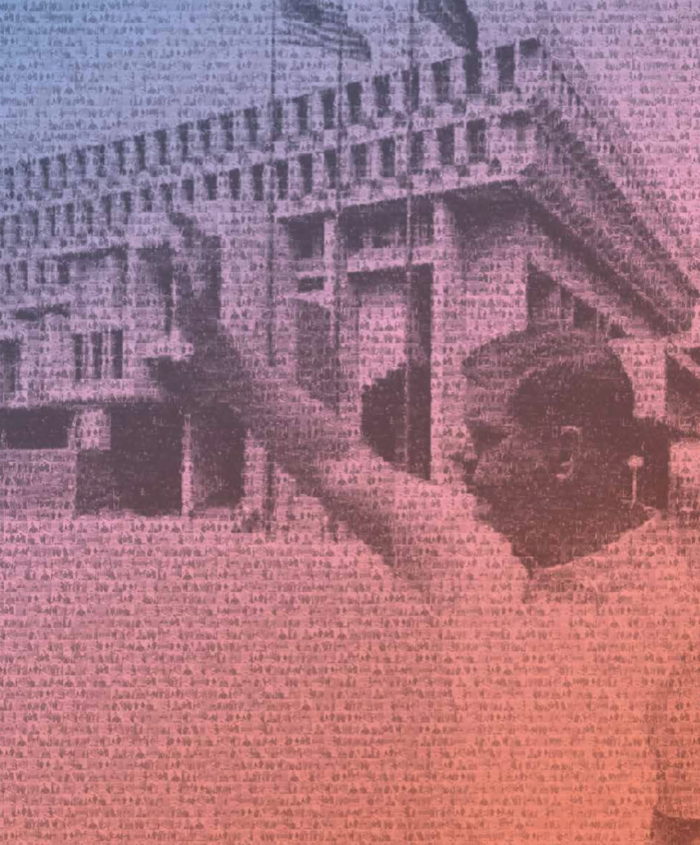
From endorsement to divorcement, for better or worse, through thick and thin, DigBoston covered Mayor Walsh like no other outlet
We’re not sure where to start, but we do know that we’re here for something bigger than to simply sing or whine about outgoing Boston Mayor Marty Walsh. His legacy is complex, of course, and should not be determined by whether he did or didn’t get your dumb cousin a job pushing papers in public works, nor by if his administration ignored every request for a meeting that your nonprofit advocacy group ever made, or, alternatively, if you’re a technocrat, old boy, or donor, his team blessed you with face time, access, contracts, and results.
This compendium is certainly abridged, even in terms of the coverage we did at the Dig. There’s simply too much to note everything. However, we tried to highlight the kind of journalism we specialize in—the stuff that few or no others bothered to check out, and the stories other outlets butchered. As a whole it may seem harsh, and that’s OK. We are not alone in believing that hizzoner is a fine and caring human who nevertheless feels, unlike us, that Boston should coddle the billion-dollar business class, even though the schools don’t ever seem to get any damn better.
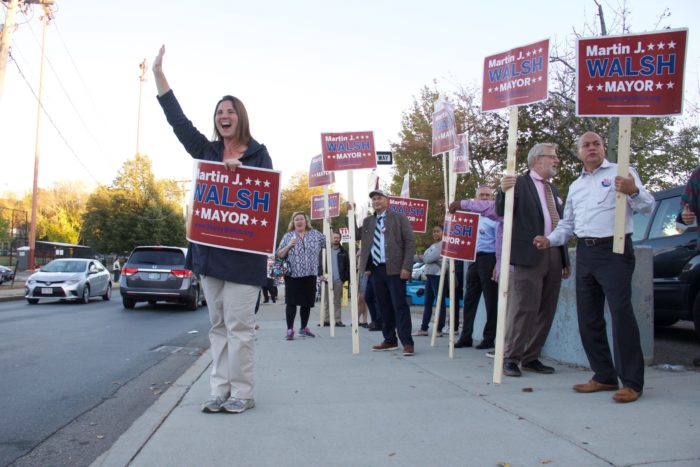
Extend that logic to any issue which applies to the middle class on down, and you’ll be on the level from which our reporters approached this administration (and any other). Below, we have compiled a chronology informed by Dig news articles, dispatches, interviews, features, columns, guest opinions, and in one rare (criminal) case, a press release from the US Attorney’s Office. Stir them in a pot and sop the soup up with the puff pieces that everybody else has been posting, and you’ll have something close to a complete and balanced account of a mayor who fought for and faithfully served his hometown for the past seven years, whether you dig him or not.
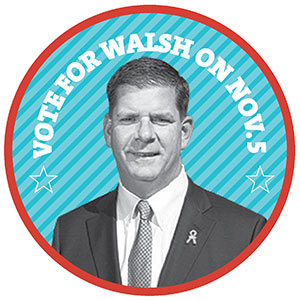 2013
2013
November – A rare flanking
As a rule, in 15 years of existence, DigBoston has stayed out of the business of endorsing candidates. But last week for the first time, the weekly newspaper endorsed Marty Walsh for mayor of Boston. –AAN.org
2014
August – Establishing “Trust”
About that “trusting relationship” between immigrants and Boston … In 2014, the Boston City Council passed the Trust Act, which was intended to stop the Boston Police Department (BPD) from turning immigrants over to US Immigration and Customs Enforcement (ICE) if they are only facing civil infractions. (But records show that the police would go on to do that anyway—nine times—in 2015.)
Authorities later exploited a loophole in the Trust Act to circumvent the law so that they could deport select immigrants. The measure was passed to ensure that the Boston police would not turn over people who faced civil charges to ICE for deportation, but said loopholes allowed cops to send people in their custody to ICE before they paid bail, which police argue the law failed to ban. –Maya Shaffer
September – The arts mayor
Call it Mayor Walsh making good on a campaign promise: This afternoon, Julie Burros was named Chief of Arts and Culture, the first cabinet-level commissioner for arts and culture in more than 20 years. The announcement ends a lengthy nationwide search for the highly anticipated “arts czar.” (Walsh outlined his plans for the arts in the first interview of his administration, which he gave to the Dig soon after his inauguration.)
In a statement released this afternoon, Walsh said, “I’ve said from Day One that I want to elevate Boston’s arts and culture profile. During the campaign, I often heard about the need for the arts to be more integrated into the lives of residents and visitors. Julie will bring a fresh perspective and a strong foundation of expertise to envision Boston’s cultural future and execute a master plan for the arts.” –Susanna Jackson
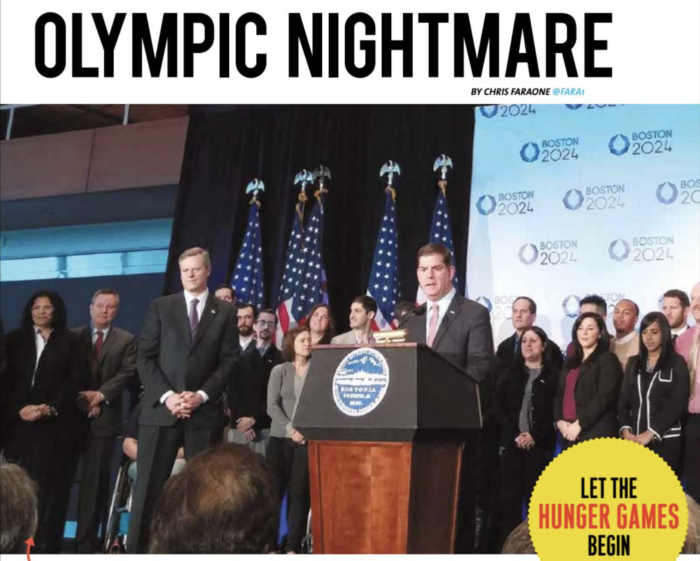
2015
January – Mayor Olympics
At the press conference in South Boston today where Mayor Walsh and his Boston 2024 pals formally announced the selection of their bid by the United States Olympic Committee (USOC), I felt like I was sitting at a funeral. To hell with any bullshit that Olympic planners have said about how their process is “just getting started,” or about how “people have seen some of the plans,” as Walsh suggested this morning. Those are lies and quarter-truths, and should be reported as such for the next decade if need be. The fact is Boston 2024 has been organizing for more than a year. –Chris Faraone
February – Marty goes national
I had a “Holy shit!” moment last week while working on a freelance assignment in Grants Pass, Oregon, a city of about 35,000 on the California border, four hours south of Portland. I was unpacking in my hotel room when the local five o’clock news came on and—bam—there was Mayor Walsh giving a press conference about parking during snow storms. I smacked the side of the television the way Mouth does in The Goonies when he can’t distinguish the real car chase from the televised one, and Walsh was still there. On the local news. In Oregon. –Chris Faraone
April – The Boston Creates initiative
The mezzanine at City Hall filled up with spectators just after noon today, in anticipation of a press conference the mayor was holding among a range of local artists, directors, producers, and representatives from theater, dance, and fine arts organizations all over the Hub. Suits and ties mixed with jeans and scarves as all settled in for the announcement of the launch of Boston’s new cultural planning initiative, Boston Creates. As the first comprehensive cultural planning initiative for the city, Mayor Walsh promised that it will unite the community and usher in a new era of innovation for the city to cement Boston’s status as “a municipal arts leader.” –Spencer Shannon
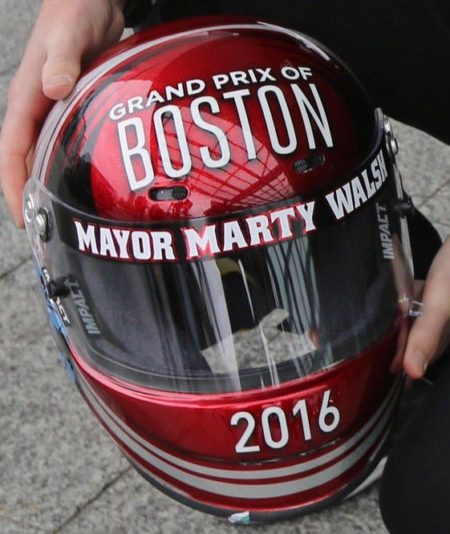
June – The answer truck
Mayor Walsh has assumed a number of seemingly superficial poses, like the “What’s Your Question” truck, a postmodern metropolitical hipster suggestion box on wheels. But his administration’s various efforts to economize and green the Hub add up to much more than a token gesture—from Boston winning top accolades from the American Council for an Energy-Efficient Economy, to the city’s spearheading a “regional agreement to establish a common policy framework throughout the Metro Boston area to prepare for climate change.” For these reasons, plus the fact that Walsh enjoys spectacular public approval ratings in spite of the disdain with which many progressives increasingly view him, environmental activists have largely left his City Hall alone, mostly focusing on campus protests north of the river. –Chris Faraone
December – The IndyCar debacle
It seems that Mayor Walsh has developed a strange habit of trying to push sporting events on the people of Boston. I mean, for a town that loves sports, he sure has made some people loathe them. No one needs to be reminded of the whole Boston Olympics debacle. Walsh ultimately dropped the games, but to paint him as a hero in the story is like congratulating someone for kicking a dead horse. Unable to take hints, Walsh also caught flack for his move to bring an IndyCar race to the streets of South Boston. “We’re trying something different and new here, and I don’t understand the pushback,” he told reporters. –Emily Hopkins
2016
March – Student protests
It was toward the end of today’s Boston Public Schools walkout. A couple hundred of the student organizers who set the afternoon action in motion were still hollering at Faneuil Hall, some taking their complaints to tourists inside Quincy Market who were observing confusedly. Mostly speaking through bullhorns to each other at that point, with news cameras long gone and the same story published by virtually every outlet in town—students from across the Hub left class to protest budget cuts, and that’s all there really is to it folks—the teens continued to express the kind of feelings they had shared and shouted all around the city.
They’re onto something. Just hours before BPS activists led their classmates through the halls of their respective schools and toward Boston Common and then the Massachusetts State House and Faneuil Hall, news broke that the administration of Mayor Marty Walsh plans to bring Forbes Media’s Under 30 Summit to the Hub in October. According to the Boston Globe, “the company hopes to attract 5,000 people to the four days of events, which will include speakers, concerts, a food festival, a business-plan competition, and a ‘service day’ intended to help improve the host city.” –Chris Faraone
Clearly the messaging and targeting of the action owed a lot to BPS parents groups and teachers unions who have become more militant of late as the funding situation has grown worse. Thanks to budget-stealing charter schools being pushed by Mayor Walsh and Gov. Charlie Baker—and the pair’s shameful recently inked deal to throw upwards of $270 million in public funds and tax breaks at General Electric to move their headquarters to Boston. Resulting in lots of “Million$ for GE, Budget Cuts for Schools” stickers and at least one “Fuck GE” sign being sported by the young activists. Plus at least one other student yelling “One Term Walsh” from a megaphone opposite Boston City Hall during the demo. But no one forced these kids to take to the streets. They know when they’re being screwed. And who’s doing it. –Jason Pramas
May – The Brissette scandal
“The City of Boston’s Director of the Office of Tourism, Sports and Entertainment was arrested this morning after a federal grand jury indicted him in connection with the extortion of a music festival production company. Kenneth Brissette, 52, was indicted for extorting a company, which had already contracted with a non-union company to provide workers for a September 2014 festival, to hire members of the International Alliance of Theatrical Stage Employees (“IATSE”), Local 11 (“Local 11”). According to the indictment, in order to stage its twice-yearly musical festivals, the company was required to apply for and receive permits from the City of Boston for each festival. At the relevant time, Brissette was the Director of the Boston Office of Tourism, Sports and Entertainment, which assists companies seeking to stage events in Boston in securing permits to use at public areas in the city.” –US Attorney’s Office
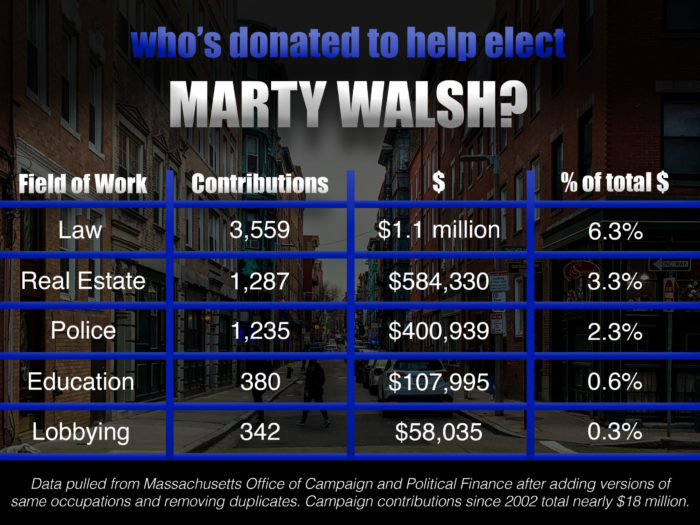
2017
February – Horizontal for Verizon
In 2016, Verizon announced that it finally would be upgrading Boston with FiOS, replacing the copper telephone wires to homes and businesses with fiber optic cable—both known as “wireline” service. Verizon claims it will spend $300 million over six years to bring FiOS to the Hub. It has even laid out a plan to divide the city into sections and allow residents to vote on which sections go first.
The media has heralded Verizon’s supposed promise that the entire city will be getting fiber to the home. Boston Mayor Walsh, in his State of the City address last month, exclaimed, “We’re making Boston a fiber optic city … 27,000 families have new internet and cable options in Dorchester, Roxbury, Roslindale, and West Roxbury. The rest of the city is on the way.”
Yes, Verizon will roll out fiber strategically, and even offer FiOS in some areas. Verizon’s carefully worded statements, however, mask its real plan, which is to migrate wireline customers to wireless, leaving much of Boston without any Verizon wire to the home or business. –Bruce Kushnick
June – Homeless speak out
For two years, your administration knew our programs were being defunded by the US Department of Housing and Urban Development, yet you failed to seek alternative sources to maintain their operation and help ensure our stability. This was followed by the ill-conceived and thoughtless implementation of a closure plan that has been seriously destabilizing. It has directly resulted in the loss of long-term employment for one of us, and caused several others to return to problematic drug use. As a person in recovery yourself, you know the grave risk relapse presents, including death, to those attempting to maintain their sobriety.
Since you became mayor, our programs were abruptly and needlessly displaced from Long Island in 2014 with no notice or plan, causing many to return to problematic drug use as a result of the trauma. Some of our friends have died as a result of this closure. The city committed to restoring Project SOAR and Safe Harbor at the Southampton Shelter when it opened eight months later. They were among the fraction of recovery services from Long Island restored in Boston, despite the exploding opioid epidemic.
Now, two and a half years after the Long Island catastrophe, your administration is reneging on even this modest and inadequate commitment. –Clients of Project Soar and Safe Harbor
December – The housing front
While activism raised the amount of “affordable” housing the BPDA planned to offer in the deal from 30% to 36%, it’s not going to help many people currently living in or near the affected neighborhoods to stay in the area unless the definition of affordable is changed to reflect economic reality. Given that fact, Mayor Walsh’s much-vaunted progress on getting more affordable housing built on his watch is based largely on smoke and mirrors because much of it remains unaffordable to the people who need it most. –Jason Pramas
December – Race relations
The Mayor’s Office of Resilience and Racial Equity hosted the 2nd Annual Boston Talks About Racism at Northeastern University. A continuation of last year’s discussion on the city’s race issues, the event was guided by Dr. Atyia Martin, the Hub’s chief resilience officer, and featured an audience Q&A period with Mayor Marty Walsh, plus breakout sessions led by moderators.
During the Q&A, Walsh sparred with audience members who questioned his effectiveness and suggested that the Walsh administration has taken actions that hurt communities of color. For starters, one audience member asked why the conversation was held in a university auditorium and not in communities of color. She added that some people of color may not have heard about the event. In response, Walsh said the talks don’t necessarily need to be held in Dorchester, Mattapan, or Roxbury. “The conversations have to happen in other neighborhoods in the city of Boston,” Walsh said. “The conversation on race has to be understood across the board.” –Olivia Deng

2018
January – The environmental shuffle
The Climate Ready Boston program released a 340-page report in December 2016 that was meant to be a comprehensive assessment of the threats presented to the city by global warming—with plans for possible correctives. It does mention the idea of building giant dikes, storm barriers, and retractable gates (which they call a “harbor-wide flood protection system”) across Boston Harbor as the method with the most potential to save much of the city from major flooding.
All of which makes sense since Mayor Walsh signed a 2015 agreement with Dutch officials to work together to manage rising sea levels. And the Dutch are recognized world experts on giant storm barriers and hydroengineering in general, lo, these last few hundred years. But there’s no firm commitment for harbor-wide defenses in the report. Yet it should be obvious that they are absolutely necessary if Boston is going to continue as a living city for even a few more decades. –Jason Pramas
June – The shuffle continues
Environmental groups protested Mayor Walsh last week during the International Mayors Climate Summit and subsequent US Conference of Mayors meeting—demanding fast action to make Boston carbon neutral (achieving net zero CO2 emissions) and better prepare the city for the many threats to the region from the already-visible effects of global warming. Like the two “once in a generation” storms this winter that both quickly flooded our waterfront. Walsh drew fire from groups like 350Mass and Mass Sierra Club for not doing much more than drafting plans to implement mainly voluntary measures to mitigate the effects of global warming in the coming years. –Jason Pramas
July – The optics campaign
The office of Boston’s outspoken mayor, Marty Walsh, announced that on the suggestion of an ordinary Bostonian, the city would be putting up posters instructing residents on how to intervene if they were to witness a Muslim being harassed. The PSA campaign posters, 50 of which would be placed around the city, featured a cartoon instructing readers on how to engage the harassee, and deflect the attention of the harasser, without physical or verbal confrontation.
The story got plenty of coverage. The optics were perfect for the city, but the impact of the campaign was basically nonexistent. Beyond a few community leaders, the voices of ordinary Boston Muslims were notably absent from the planning or evaluation of the campaign or its content. When the campaign was announced, I talked to about a dozen Boston-area Muslims from a variety of backgrounds. Their reactions were extremely mixed, running the gamut from positive to finding the content offensive. –Claire Sadar
October – Welcome to the jungle
At least 17 Massachusetts cities and towns are now preparing to do battle with each other—and hundreds more municipalities nationwide—for the dubious “honor” of “winning” the right to throw enough public money and tax breaks at Amazon to become the site of its new Headquarters 2 (HQ2). Despite the fact that such a “victory” will result in a worse regional housing crisis, provide mainly low-paying unstable jobs with subcontractors to working class natives without college degrees while tossing thousands of good jobs to software engineers from out of state, and give the vast corporation far too much power in state politics.
Mayor Walsh is all over this one. Fresh off of colluding with Gov. Baker to cut a secret deal to lavish tens of millions on General Electric to bring its once-and-future headquarters to the Hub, he’s back to his old tricks with Amazon. Four possible HQ2 sites are being considered, according to the Globe: putative front-runner Suffolk Downs (partially in Revere), Widett Circle in South Boston, Beacon Yards in Allston, and an area adjacent to South Station. –Jason Pramas
2019
February – Corporate wreckage
The official account pushed by GE and its allies in government and media goes like this: Once upon a time, a megacorp called General Electric got tired of having its world headquarters in boring suburban Connecticut and decided to move the facility to somewhere super hip and awesome. In 2015, it put the word out about its plans to select government leaders and was gratified to find that Mass Gov. Charlie Baker and Boston Mayor Marty Walsh were willing to offer it an extremely generous package of incentives to move to our “city upon a hill.”
After months of hush-hush negotiations, the company agreed to build a new HQ in Boston and create 800 jobs there in exchange for $120 million from the state and $25 million from the city. An appropriate plot of land was identified in the Fort Point neighborhood and GE pledged to build an awesomely groovy complex on it—with a corporate logo that would be visible from space! And, like, a helipad! Everyone that mattered agreed that this was a most excellent use of public money, and all was well and right with the world. The project was on track for completion by 2019, new jobs were on the way, billions of dollars were expected to flow into the Greater Boston economy, and the governor and mayor were lauded as heroes. (Spoiler alert: None of those things ever ultimately happened.) –Jason Pramas
July – Less than zero but still something
Boston’s plan to achieve “zero waste” by 2050 has drawn plenty of attention for its flashy prospects. What’s been largely overlooked, however, is a policy shift decades in the making that will mean more money for low-wage recycling workers.
For the first time in its 22-year history, Boston’s living wage ordinance will be applied to the city’s new recycling contract starting in July. This means all workers will earn at least $15.31 per hour for time spent working on the contract, with annual escalations. This is seen as a half-measure by critics who wanted the rate applied full-time, but the incremental change is still notable. Casella Waste Systems, the publicly traded regional agglomerate that sorts residential recyclables in Charlestown, has never agreed to do this before. (Ed. note: While we hope that all of our reporting has impact on some level, Cole’s work on this particular topic, reported in collaboration with our partners at the Boston Institute for Nonprofit Journalism, appears to have applied direct pressure that spurred the city to act on this front.) –Cole Rosengren
August – Red carpet treatment
Activists from 19 grassroots organizations marched through downtown Boston Sunday afternoon to protest the American Correctional Association (ACA), which was holding its annual conference at the Hynes Convention Center. The ACA is one of the largest accreditation agencies in the United States. It ensures for-profit prisons and immigration detention facilities meet federal and local guidelines, and health and safety standards.
Massachusetts Gov. Baker and Boston Mayor Walsh welcomed ACA members to the “149th Congress of Correction,” with letters published in the conference program. Mayor Walsh wrote, in part, “Boston’s thriving institutions provide the perfect backdrop for your members to learn about new, emerging technologies and develop leadership skills in your industry.” –Gino Canella
2020
July – A Boston-style reckoning
On Juneteenth, Boston City Council President Kim Janey proposed initiatives to Walsh, who in the waning days of the budget season last month had to choose: adopt token cuts that won’t rankle the BPD’s rank and file, or tackle systemic racism head on?
Instead of embracing the bold vision that Janey and others had for police reform, the mayor once again sided with his police patrons and shifted only $12 million—less than half of what many protesters were asking for—from the BPD budget to desperately needed mental health, housing, and social services.
At this point, Walsh’s bungled response and reluctance to truly reform the BPD is a lost opportunity for the thousands of Bostonians who marched this summer amidst a pandemic to demand real change and an end to systemic racism. –Chip Goines
December – Hall pass
Peter Faneuil, an 18th Century Boston merchant, was known for his business acumen. He obtained his wealth from inheritance and his participation in the commodity market. Included in those commodities were human beings. Active in the slave trade until his death in 1742, Faneuil also owned five human beings valued today at $123,679.68.
Today, Confederate monuments are rapidly coming down. But in Boston, Mayor Walsh has declined to respond to a 20-week old request for a conversation with proponents. Boston City Council members have also ignored calls for a public hearing. On the one hand, Walsh has been hesitant to return the damaged Christopher Columbus statue in the North End until the city assesses its historical meaning. On the other hand, Faneuil Hall remains. –Barry Lawton
2021
January – Finally, some accountability
Mayor Marty Walsh signed an ordinance creating the new Office of Police Accountability and Transparency on Jan. 4. The office will house the Civilian Review Board, which investigates complaints from the public, and the Internal Affairs Oversight Panel, and an administrative arm. It will have subpoena power to call upon witnesses and demand documents.
“Now is the time to act with urgency to dismantle systemic racism across our city,” Walsh told the press. “The Office of Police Accountability and Transparency will support lasting, generational change by rooting out impropriety and ensuring the type of enhanced oversight that leads to greater community trust. This is an important milestone, but it’s only the beginning.” –Shira Laucharoen
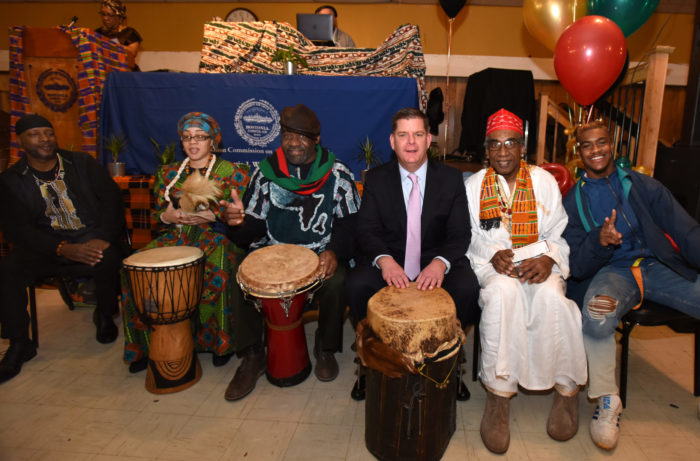
BONUS: THE MUSIC OF MARTY
BY DIG STAFF
Additional research by Mihiro Shimano + MaryCatherine Neal
When we think of Marty Walsh and the arts, a few things come to mind.
The first memory is an especially bright one, as the mayor gave the Dig his very first interview in office, and in that chat made his initial formal announcement about plans to install an arts czar and to fulfill other campaign pledges in this realm.
Largely thanks to Walsh advisor Joyce Linehan, who had a very cool job at City Hall but would probably be the first to tell you that her previous career working with famous musicians was even sweeter, the mayor got behind some noteworthy initiatives during his tenure. The most famous of which is probably his futile effort to get Jonathan Richman’s “Roadrunner” installed as the official rock song of Massachusetts, a crusade that began back when Walsh was but a wee state rep.
There are many other such examples, like when the mayor declared April 9 Riot Grrrl Day in Boston, and then there are the major moments, like Walsh being the subject of a four-hour doc by local icon Fredrick Wiseman (we highly recommend Dig film writer Jake Mulligan’s writeup on City Hall), and that time two officials from his administration were convicted of extortion in a case related to their forcing the company behind Boston Calling to use union workers.
Let’s keep this positive though, with a handy reference compendium of standout appearances our mayor made in books and films and on TV shows …
BOOKS
-
This Way To City Hall by Gintautas Dumcius (2013)
-
HIZZONNAROO: The fervent fete and street fight to replace a Boston patriarch by Chris Faraone (2013)
-
Boston Strong: A City’s Triumph over Tragedy by Casey Sherman + Dave Wedge w/ forward by Martin J. Walsh (2015)
-
No Boston Olympics: How and why Smart Cities are Passing on the Torch by Chris Dempsey + Andrew S. Zimbalist (2017)
-
Becoming Boston Strong: One Woman’s Race to Run and Conquer the World’s Greatest Marathon by Amy Noelle Roe (2019)
-
Slaying Goliath: The Passionate Resistance to Privatization and the Fight to Save America’s Public Schools by Diane Ravitch (2020)
MOVIES
-
City Hall by Fredrick Wiseman (2020)
-
The film won Best Film at Cahiers du Cinéma (2020), and the Fair Play Cinema Award at the Venice Film Festival (2020)
-
-
Rocky Ros Muc by Michael Fanning (2017)
-
This doc on boxer Sean Mannion who emigrated from Ireland to Boston was nominated for Best Irish Language Programme at the Irish Film and Television Awards (2018)
-
TV
-
Top Chef: Sudden Death (2014)
-
Diners, Drive-ins and Dives: Triple D Nation: From Near to Far (2020)
Dig Staff means this article was a collaborative effort. Teamwork, as we like to call it.


